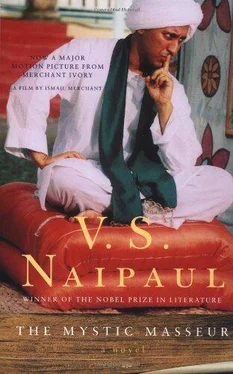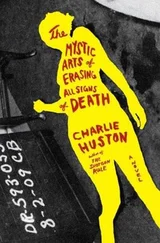But Ganesh found that for an M.L.C. Port of Spain was a pleasant place. He got used to it and even liked it. There were two good libraries, and so many bookshops! He dropped Indology, religion, and psychology and bought large books on political theory. He had long discussions with Indarsingh.
At first Indarsingh was bitter. ‘Funny people in Trinidad, old boy. No respect for ideas, only personalities.’
But he softened as time went on and he and Ganesh worked on a new political theory.
‘Came to me in a flash, old boy. Reading Louis Fischer’s book about Gandhi. Socialinduism. Socialism-cum-Hinduism. Hot stuff, old boy. Outlines settled. Details demn tricky, though.’
So far the autobiography, and the private man.
But by this time Ganesh was a public figure of great importance. He was always in the papers. His speeeches inside and outside the Legislative Council were reported in detail; he was constantly photographed leading delegations of aggrieved taxi-drivers or scavengers or fish-vendors to the Red House; and he was always ready with a press conference or a letter to the editor. Everything he did or said was News.
He was a terror in the Legislative Council.
It was he who introduced the walk-out to Trinidad and made it popular as a method of protest. The walk-out was no sudden inspiration. It had crude beginnings. At first he simply lay flat on his back on the Council table and refused to move. Policemen had to lift him up. Acts like this caught the public imagination and in no time at all Ganesh became popular throughout the South Caribbean. His photograph appeared constantly in the newspapers. Then he discovered the walk-out. In the beginning he just walked out; later, he walked out and gave interviews to reporters on the steps of the Red House; finally, he walked out, gave interviews, and addressed the crowd of beggars and idlers from the bandstand in Woodford Square. Often the Governor passed a weary hand over his forehead and said, ‘Mr Ramsumair, what have we done to offend you this time? Please don’t stage another walk-out.’ And the invariable concomitant of a headline announcing the passing of a bill was GANESH STAGES A WALK-OUT. Later this was shortened and a typical newspaper headline was:
LAND RESETTLEMENT BILL PASSED
Ganesh Walks Out
They made a calypso about him which was the second road-march at the Carnival in 1947:
There is a gentleman of the opposition
Suffering a sort of legislative constipation.
Everybody moving — bills for so,
But with this gentleman nothing can go.
The reference to Profitable Evacuation was clear. But even before the calypso, Ganesh had begun to find his mystic career an embarrassment. Certain paragraphs of What God Told Me had often been read out in the Council Chamber; and in November 1946, just four months after he had published it, he suppressed The Years of Guilt, as well as his other books, and wound up Ganesh Publishing Company Limited.
There was no doubt that at this time Ganesh was the most popular man in Trinidad. He never went to a cocktail party at Government House. He never went to dinner there. He was always ready to present a petition to the Governor. He exposed scandal after scandal. And he was always ready to do a favour for any member of the public, rich or poor. For such favours his fees were never high. He always said, ‘You must give only what you can afford.’ People like Primrose and the Christian had high fixed rates, went to every cocktail party at Government House, and wore dinner-jackets. You couldn’t say that either of them really represented his constituency. The Christian, as a matter of fact, now owned most of his; and Primrose became so wealthy he had to be knighted.
In Colonial Office reports Ganesh was dismissed as an irresponsible agitator with no following.
He had no idea that he was on the road to the M.B.E.
This is how it happened.
In September, 1949, a wild strike ripped through some sugar estates in South Trinidad. It was the most exciting thing since the oilfield riots of 1937. Strikers burnt cane-fields and policemen beat up strikers and spat in the mouths of those they arrested. The press thundered with threats and counter-threats. Sympathy for the strikers was high and people who had never thought of striking themselves cycled past the pickets and whispered, ‘Keep it up, boys!’
Ganesh was in Tobago at the time, investigating the scandal of the Help the Children Fund. He made a vague speech about it but the Niggergram at once spread a story that he was going to mediate. The sugar estates said they knew nothing about it. Ganesh told a Sentinel reporter that he was going to do all he could to bring about an amicable settlement. The estates denied that they had ever consented to having a mediator at all. Ganesh wrote to the Sentinel that whether the estates liked it or not he was going to mediate.
In the few days that followed, Ganesh was at the peak of his popularity.
He knew nothing about the strike except for what he had read in the newspapers; and it was the first time since he had been elected that he had to deal with a crisis in South Trinidad. Hitherto he had been mainly involved in exposing ministerial scandals in Port of Spain. His whole approach to the strike was so thoughtless that we can perhaps — as he himself said later — see the hand of Providence once more in his career.
In the first place he went South in a lounge suit. He took books, but they were not religious books, only the writings of Tom Paine and John Stuart Mill and a large volume on Greek Political Theory.
The moment he got to Lorimer’s Park, a few miles out of San Fernando, where the strikers waited for him, he sensed that something was wrong. So he said later. Perhaps it was the rain the night before. The banners were still damp and their denunciations looked half-hearted. The grass had disappeared beneath the mud churned up by the strikers’ bare feet.
The strike-leader, a short fat man in a striped brown suit, led Ganesh to the platform. This was nothing more than two Morris car crates; smaller boxes served as steps. The top of the platform was wet and muddy. Ganesh was introduced to the half dozen or so members of the strike committee and the man in the brown suit immediately set to work.
He shouted, ‘Brothers and sisters, you know why the Red Flag red?’
The police reporters scribbled conscientiously in longhand in their noteboooks.
‘Let them write it down,’ the leader said. ‘Let them write down in their dirty little black books that we ain’t fraid them. Tell me, we fraid them?’
A short stout man came out from the crowd and walked to the platform. ‘Shut your tail up,’ he said.
The leader insisted, ‘Tell me, we fraid them?’
There was no response.
The man below the platform said, ‘Cut out the talk and say something quick.’ He was rolling up his shirt-sleeves almost up to his armpits. He had powerful arms.
The leader shouted, ‘Let we pray.’
The heckler laughed. ‘Pray for what?’ he shouted. ‘For you to get fatter and burst your suit?’
Ganesh began to feel uneasy.
The leader unclasped his hands after his prayer. ‘The Red Flag dye with we blood, and is high time for we to hold up we head high high in the market-place like free and independent men and command big big armies in heaven.’
More men came out from the crowd. The whole crowd seemed to have moved nearer the platform.
The heckler shouted, ‘Cut out the talk. Go back to the estates and beg them to take back the bribe they give you.’
The leader talked on, unheard.
The strike committee fidgeted in their folding chairs.
The leader slapped his forehead and said, ‘But what happening? I forgetting that all you here to hear the great fighter for freedom, Ganesh Ramsumair.’
Читать дальше












